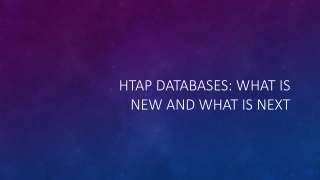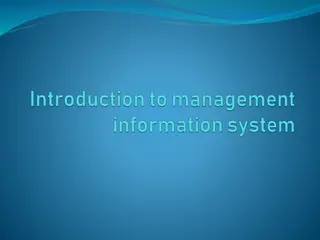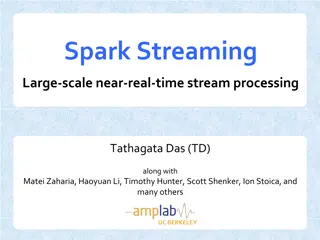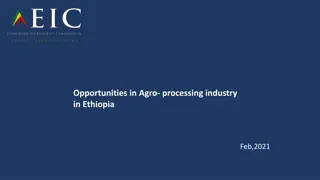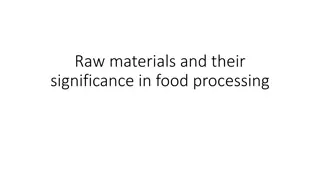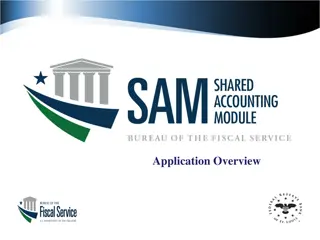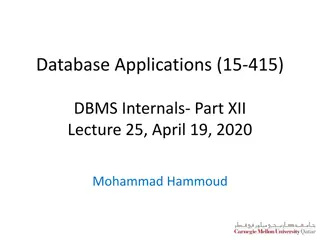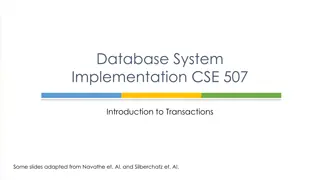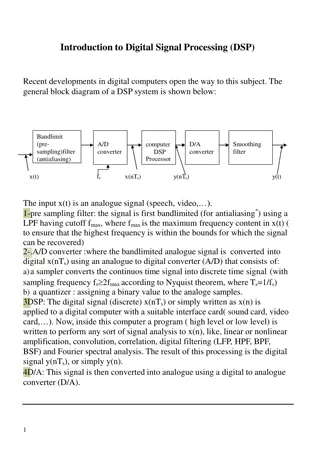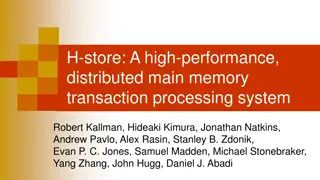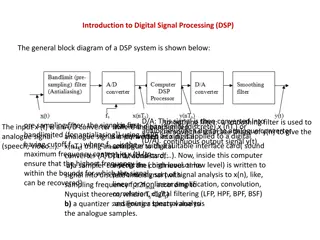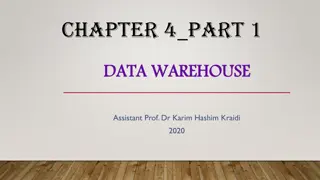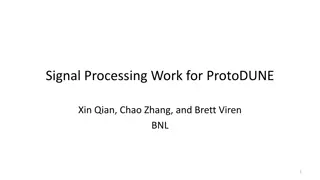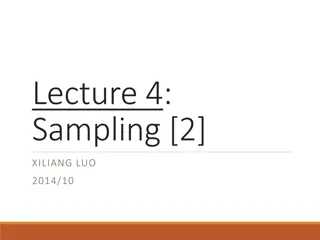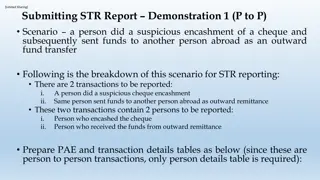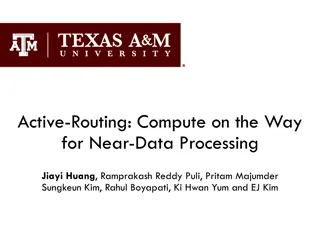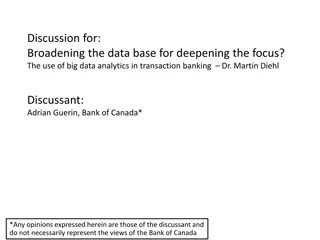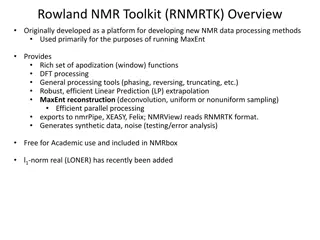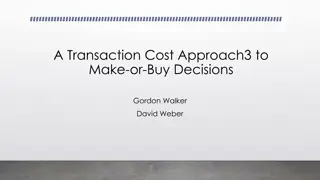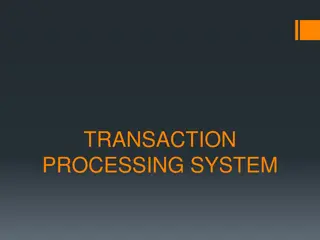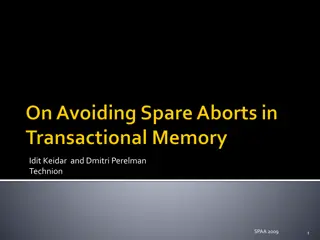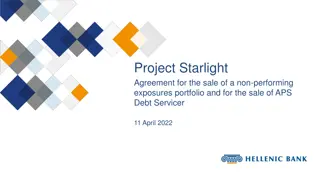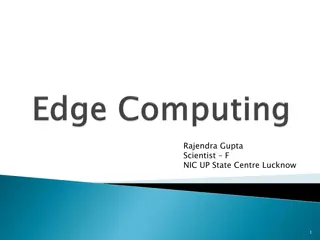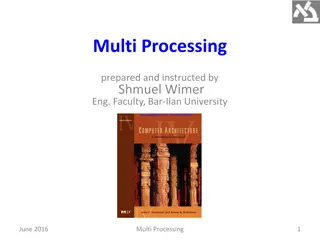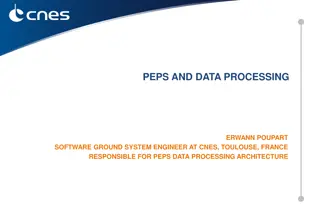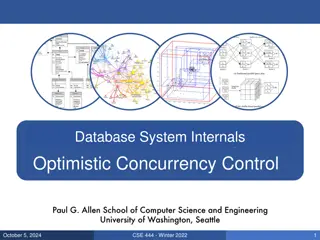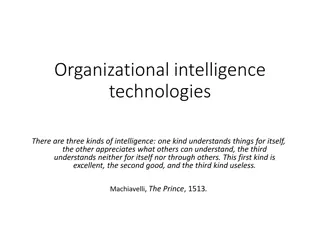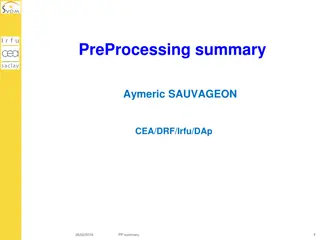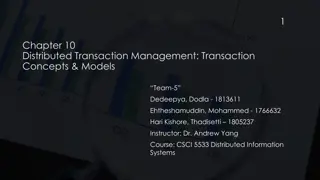Revolutionizing Data Management with HTAP Databases
Organizations handle a vast amount of data daily, necessitating efficient systems like Hybrid Transactional Analytical Processing (HTAP). This advanced system streamlines online transaction processing (OLTP) and analytical processing (OLAP), enabling real-time insights and prompt actions. HTAP datab
2 views • 22 slides
National Food Processing Policy and Its Importance
National Food Processing Policy aims to address the significant wastage in food production through value addition and efficient processing. The policy highlights the reasons for food processing, including reducing losses in the supply chain and enhancing quality. It emphasizes creating an enabling e
1 views • 19 slides
Lubbock Retail Integration Task Force Meeting Highlights
Lubbock Retail Integration Task Force (LRITF) meeting on January 9th, 2023, covered various topics including Customer Choice Transaction Window review, Winter Storm Uri securitization, Distribution Loss Factors revision, and more. Action items discussed included the acceptance of EDI transactions fo
1 views • 13 slides
Scaling the Blockchain: Rollups for Increased Transaction Speed
Exploring the challenges of scaling blockchain networks to match the transaction speeds of traditional payment networks like Visa. Solutions such as Rollups, batch processing, and payment channels are discussed to increase transaction throughput while maintaining low fees.
1 views • 57 slides
Financial Intelligence and Transaction Monitoring Conference 2022
Leading experts from the Financial Intelligence Analysis Unit (FIAU) share insights on transaction monitoring, compliance measures, and enforcement strategies at the Financial Intelligence and Transaction Monitoring Conference 2022. The event features informative sessions, case studies, panel discus
0 views • 6 slides
Management Information Systems (MIS)
Management Information Systems (MIS) are vital for collecting, processing, and analyzing data in business activities. They assist decision makers, facilitate communication, and maintain records. Components include people, data, business procedures, hardware, and software. Various types of informatio
3 views • 11 slides
Introduction to Spark Streaming for Large-Scale Stream Processing
Spark Streaming, developed at UC Berkeley, extends the capabilities of Apache Spark for large-scale, near-real-time stream processing. With the ability to scale to hundreds of nodes and achieve low latencies, Spark Streaming offers efficient and fault-tolerant stateful stream processing through a si
0 views • 30 slides
Opportunities in Ethiopia's Agro-Processing Industry
Ethiopia stands out as a leader in raw material production for agro-processing industries, offering opportunities in dairy, juice processing, edible oil processing, poultry, beef production, and tomato processing. With abundant resources, suitable climate conditions, and a growing domestic market, E
2 views • 8 slides
Significance of Raw Materials in Food Processing
Effective selection of raw materials is crucial for ensuring the quality of processed food products. The quality of raw materials directly impacts the final products, making it important to procure materials that align closely with processing requirements. Quality evaluation, including microbiologic
2 views • 30 slides
SAM Application Overview and Transition Guide
This content provides an in-depth overview of the SAM (System for Award Management) application, including its purpose, functionality, and role within the transaction life cycle. It covers the electronic training, validation processes, transaction placement, and the transition steps to set up SAM ef
0 views • 23 slides
Transaction Management in DBMS
In this lecture, Mohammad Hammoud covers the key aspects of transaction management in database management systems (DBMS). Topics include locking protocols, anomaly avoidance, lock managers, and two-phase locking. The session delves into the rules, data structures, and processes involved in maintaini
2 views • 56 slides
Properties of Database Transactions
Database transactions play a crucial role in ensuring data integrity and consistency within a database system. This content explores the fundamental properties of transactions, such as atomicity, durability, consistency, and isolation. It delves into the requirements and implications of each propert
2 views • 44 slides
Overview of Digital Signal Processing (DSP) Systems and Implementations
Recent advancements in digital computers have paved the way for Digital Signal Processing (DSP). The DSP system involves bandlimiting, A/D conversion, DSP processing, D/A conversion, and smoothing filtering. This system enables the conversion of analog signals to digital, processing using digital co
1 views • 24 slides
H-Store: A High-Performance, Distributed Main Memory Transaction Processing System
H-Store is an experimental main-memory DBMS optimized for online transaction processing (OLTP) applications. It is highly distributed and runs on a cluster of shared-nothing, main memory executor nodes. The system stores data in tables with each row corresponding to a record, ensuring atomic transac
1 views • 22 slides
Digital Signal Processing (DSP) Systems: Linearity, Causality, and Stability
Digital Signal Processing (DSP) involves converting signals between digital and analog forms for processing. The general block diagram of a DSP system includes components like D/A converters, smoothing filters, analog-to-digital converters, and quantizers. DSP systems can be classified based on line
1 views • 12 slides
Contrasting Operational Database Systems and Data Warehouses: Key Variances Explained
Understanding the disparities between operational database systems (OLTP) and data warehouses (OLAP) is crucial. OLTP systems focus on transaction processing for daily operations, while OLAP systems cater to data analysis and decision-making needs. Variances include user orientation, data content, d
1 views • 12 slides
Advancements in Signal Processing for ProtoDUNE Experiment
The team, including Xin Qian, Chao Zhang, and Brett Viren from BNL, leverages past experience in MicroBooNE to outline a comprehensive work plan for signal processing in ProtoDUNE. Their focus includes managing excess noise, addressing non-functional channels, and evolving signal processing techniqu
1 views • 23 slides
Sampling and Signal Processing Fundamentals
Sampling plays a crucial role in converting continuous-time signals into discrete-time signals for processing. This lecture covers periodic sampling, ideal sampling, Fourier transforms, Nyquist-Shannon sampling, and the processing of band-limited signals. It delves into the relationship between peri
1 views • 60 slides
Demonstration: Reporting Suspicious Transactions and Persons for STR
Demonstrating the process of reporting suspicious cheque encashment and outward fund transfer transactions involving two individuals - one who encashed the cheque and the other who received funds abroad. Includes detailed person and transaction information for both instances, along with the preparat
0 views • 41 slides
Insights into Vertical Integration in 19th Century America Through Transaction Cost Economics
Exploring Alfred Chandler's work and its application in understanding the evolution of business organizations in the 19th and early 20th centuries in America. The article applies transaction cost theory to explain historical shifts towards vertical integration, emphasizing the cost-efficiency of int
2 views • 16 slides
Enhancing Near-Data Processing with Active Routing
Explore the implementation and benefits of Active-Routing for efficient data processing in memory networks. Motivated by the increasing demands for memory in graph processing and deep learning, this approach aims to reduce data movement, energy consumption, and costs associated with processing large
0 views • 46 slides
Information Systems in Organizations: Overview and Implementation
Information systems play a crucial role in organizations, encompassing transaction processing systems, functional area information systems, and enterprise resource planning systems. This content delves into the purpose of transaction processing systems, the support provided by information systems ac
2 views • 30 slides
Exploring the Potential of Big Data Analytics in Transaction Banking
Big Data Analytics (BDA) offers valuable insights in transaction banking through varied data sources and methods like Supervised, Unsupervised, and Reinforcement learning. Use cases include anomaly detection, fraud detection, default prediction, forecasting, and sentiment analysis. Discussions also
0 views • 8 slides
Transaction Processing System (TPS) Sales Data
This document contains detailed transaction data from a Transaction Processing System (TPS) including customer IDs, dates, receipt numbers, order numbers, product details, quantities, unit prices, and totals. The data spans multiple dates and includes information about sales transactions for various
0 views • 10 slides
Overview of RNMRTK Software for NMR Data Processing
Rowland NMR Toolkit (RNMRTK) is a comprehensive software platform primarily used for NMR data processing tasks such as running MaxEnt, apodization, DFT processing, linear prediction, and more. It offers a robust set of tools for various processing needs and supports efficient parallel processing. RN
0 views • 17 slides
Transaction Cost Approach to Make-or-Buy Decisions
This study explores the influences of supplier market competition, volume uncertainty, technological uncertainty, and production costs on make-or-buy decisions. Transaction cost economics theory highlights the impact of uncertainty and asset specificity on such decisions, with a focus on buyer-suppl
0 views • 10 slides
Transaction Processing Systems (TPS)
Transaction Processing Systems (TPS) are vital components in capturing, storing, and processing data generated from various business transactions. They ensure efficient handling of high volumes of data while maintaining accuracy, security, and privacy. TPS operate through automated data entry, batch
0 views • 24 slides
Analysis of Transactional Memory Techniques in Multi-Core Architectures
Emerging multi-core architectures have led to the adoption of Transactional Memory (TM) as a new synchronization method. This study delves into the challenges of TM, examining the consequences of transaction aborts, the need for spare aborts, and evaluating measures to enhance transaction processing
0 views • 23 slides
Hellenic Bank Sale Agreement & Portfolio De-Risking Transaction
Hellenic Bank has finalized a significant transaction involving the sale of a non-performing exposures portfolio and APS Debt Servicer to Oxalis, resulting in substantial de-risking of its balance sheet. The agreement includes the securitisation of NPEs and sale of the servicing platform. The transa
0 views • 5 slides
Centre of Excellence in Signal Processing Activities and Progress Report
Broad areas of signal processing activities at the Centre of Excellence in Signal Processing include audio, speech, language, medical image processing, computer vision, wireless communications, and machine learning. The center focuses on addressing various challenges in audio/speech recognition, emo
0 views • 17 slides
Edge Computing for Optimizing Internet Devices
Edge computing brings computing closer to the data source, minimizing communication distances between client and server for reduced latency and bandwidth usage. Distributed in device nodes, edge computing optimizes processing in smart devices instead of centralized cloud environments, enhancing data
0 views • 32 slides
Multi-Processing in Computer Architecture
Beginning in the mid-2000s, a shift towards multi-processing emerged due to limitations in uniprocessor performance gains. This led to the development of multiprocessors like multicore systems, enabling enhanced performance through parallel processing. The taxonomy of Flynn categories, including SIS
0 views • 46 slides
Insight into PEPS Data Processing Architecture by Erwann Poupard
Erwann Poupard, a Software Ground System Engineer at CNES, Toulouse, France, plays a crucial role in the PEPS data processing architecture. The outline covers PEPS HPSS data storage statistics, current data processing trends, and future plans including PEPS V2 development. Explore PEPS processing ch
0 views • 8 slides
Concurrency Control in Database Systems
Dig into the world of concurrency control in database systems, exploring topics such as pessimistic vs. optimistic concurrency, snapshot isolation, and the importance of timestamps in ensuring transaction order and recoverability. Learn about the mechanisms behind preventing unserializable schedules
0 views • 50 slides
Organizational Intelligence Technologies
Organizational intelligence technologies involve three kinds of intelligence - understanding independently, appreciating what others can understand, and understanding neither for itself nor through others. This concept emphasizes the importance of collecting, storing, processing, and interpreting da
0 views • 47 slides
Data Processing and Preprocessing Summary
In this document, Aymeric Sauvageon from CEA/DRF/Irfu/DAp presents a detailed overview of the preprocessing steps involved in data processing from L0 to L1. It covers the definition of L0/L1 and coding, utilization of the database for processing, input file specifications from China, packet content
0 views • 11 slides
Distributed Transaction Management in CSCI 5533 Course
Exploring transaction concepts and models in distributed systems, Team 5 comprising Dedeepya, Dodla, Ehtheshamuddin, and Hari Kishore under the guidance of Dr. Andrew Yang delve into the intricacies of distributed transaction management in CSCI 5533 Distributed Information Systems.
0 views • 56 slides
Orleans Streaming Orleans Streaming
In this content, Orleans Streaming and real-life scenarios are discussed, highlighting the flexibility of stream processing logic, support for dynamic topologies, and fine-grained stream granularity. The content explores scenarios such as actor calls, IoT device event processing, chat room events, a
0 views • 17 slides
Efficient Transaction Management
Gain insights into managing transactions, checking their status, and approving them seamlessly using the provided instructions. View transaction history, understand approval workflows, and track transaction status effortlessly. Make use of available resources for a streamlined transaction process.
0 views • 33 slides
VIRTUAL CARD (VCARD) REQUESTS
Detailed process of vCard transactions, including request submissions, approval timelines, restricted items, and transaction types. Learn how to initiate a vCard transaction, complete approvals, and choose between transaction completion options. Follow the guidelines for efficient and secure virtual
0 views • 13 slides
